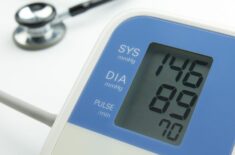Stats & Figures: Is A Chemical Pregnancy Common?
About 10-20% of pregnancies end in a miscarriage – and 50-75% of miscarriages are chemical pregnancies. It’s an early pregnancy loss shortly after implantation. (1)(2)
Experts believe the numbers could be higher.
That’s because some women don’t even realize they had a very early miscarriage. About 25% of pregnancies that end with a miscarriage happen even before women miss their period. (1)(2)
A chemical pregnancy happens at around five weeks gestation. You’ll likely think it might only be a late period.
One day of a missed period can be big if you’re TTC. Yet other women don’t even count their cycle days. Others also have irregular periods, and might not notice being a few days late.
So, what is a chemical pregnancy, and why is it common? How can you tell if it’s an early miscarriage from a chemical pregnancy instead of implantation bleeding or period?
Pregnancy loss is heartbreaking, especially if you’re experiencing fertility challenges while TTC. Yet you might be wondering if a chemical pregnancy is a “real” pregnancy. If yes, is it normal to grieve its loss?
What causes a chemical pregnancy, how is it diagnosed and treated, and is there a way to prevent it?
We’ll answer your burning questions about this pregnancy concern below.
What Exactly Is A Chemical Pregnancy (Early Miscarriage)?
A chemical pregnancy (also called a biochemical pregnancy) is an early miscarriage or pregnancy loss that occurs shortly after implantation. The pregnancy is spontaneously terminated. (1)
It’s possible to get a positive pregnancy test, but the fertilized egg doesn’t grow to form an embryo that can be clinically confirmed. Often, a fetus or embryo can’t be detected in an ultrasound. (1)
In many cases, the woman doesn’t show any symptoms. Others might experience light bleeding or period-like cramps. (1)
Because it happens so early in pregnancy, many women might think it was a slightly delayed period, not a chemical pregnancy.
What Makes A Chemical Pregnancy Different From A Clinical Pregnancy?
A clinical pregnancy shows clinical signs, such as the presence of an embryo confirmed by its heartbeat and a gestational sac in the womb. (3)
A clinical pregnancy can also have “chemical” signs, such as the detection of hCG (human chorionic gonadotropin) levels, which is used in pregnancy tests. (3)
Often, the clinical signs of the embryos’ presence are detected around five weeks gestation, which is also around the time that a pregnancy is lost. (3)
Although some chemical signs, such as a positive pregnancy test, can appear in a chemical pregnancy, it lacks the clinical signs of an embryo in the womb. (3)
However, you can also get a negative pregnancy test because the low hCG levels might still be undetectable at this point.
Can A Chemical Pregnancy Be Considered A Real Pregnancy?
Yes. Even if you lose it early on, a chemical pregnancy is still a real pregnancy. That zygote was still formed from the union of an egg and a sperm. (1)
Duration: How Many Weeks Or Months Does A Chemical Pregnancy Usually Last?
Often, a chemical pregnancy lasts for about 2-3 weeks from conception or around 4-5 weeks gestation (counted as the weeks after your last menstrual period). (3)
Will A Chemical Pregnancy Terminate On Its Own?
Yes. Because a chemical pregnancy doesn’t have a properly formed embryo, your reproductive system is programmed to terminate it. That’s why it’s also called an early miscarriage or pregnancy loss.
Is There Any Chance A Chemical Pregnancy Can Become A Baby?
Sadly, none. A chemical pregnancy is called that way because it can be chemically recognized as a pregnancy by the presence of the hCG hormone. However, there isn’t any clinical sign of a fetus, so it will never become a full-term baby or a successful pregnancy.
Signs & Symptoms Of A Chemical Pregnancy
Different women can experience varied symptoms or signs of a chemical pregnancy. Some don’t even experience any signs.
For many, a chemical pregnancy can feel similar to period pains. It can be accompanied by bleeding that’s heavier than usual. Many also experience light bleeding around the time they get their period, so it can easily be mistaken for menstruation. (4)
However, it might also be accompanied by heavy bleeding and can show similar symptoms as other types of miscarriages. (2)(13)
Can You Tell A Chemical Pregnancy With Certain Bleeding Signs?
Most of the time, it’s difficult to know for certain if you’re having a chemical pregnancy just by checking the bleeding signs. (4)
Some women might bleed lightly, similar to a period. Others can have heavier bleeding. (4)
You might even confuse it with implantation bleeding (usually brown discharge about six weeks from your last period) or pregnancy spotting (reddish discharge, also usually at around six weeks).
It usually has less blood than other forms of miscarriage because the cells (a zygote) is still small at five weeks gestation, and the placenta (if there’s one) is still starting to form at this point.
Often, it’s also difficult to distinguish the type of miscarriage or bleeding you’re experiencing unless your healthcare provider performs further diagnostic tests.
Diagnosis: What Are The Tests To Confirm A Chemical Pregnancy?
- Pregnancy test (but this can also give a negative result because your body hasn’t produced enough hCG hormones to be detected)
- Transvaginal ultrasound (an abdominal ultrasound isn’t used because the embryo or blood clots are too small to be detected)
How To Prepare For The Chemical Pregnancy Diagnostic Tests
Home Pregnancy Test Kit
- This test uses urine and can be done at home, even without experience.
- You can get an over-the-counter pregnancy test kit. It’s the least expensive option.
- It’s best to use your first urine in the morning because it can have the highest hCG levels than at other times of the day.
- Read the instructions if this is your first time using the kit. You can put urine in a disposable cup. Use the test kit’s dropper or strip (depending on the test kit you bought).
Blood Pregnancy Test
- Blood test done at the hospital or diagnostic laboratory
- No prior preparation is necessary
- Pricier than a home kit but more sensitive in detecting hCG hormone levels, especially in early pregnancy
Transvaginal Ultrasound
- An ultrasound wand (transducer) is inserted into your vagina to examine your uterus, vagina, cervix, fallopian tube, bladder, and other organs in or closely around your reproductive system.
- Your healthcare provider (or the lab technician) will put a condom on the transducer before inserting it in your vagina.
- It’s an invasive but usually painless procedure.
- Wear clothes with a bottom section that’s easier to remove or slip out. (Many doctor’s offices will ask you to remove your bottoms and provide you with a gown or sheet.)
- Remove your tampons or use pads instead.
- Follow your healthcare provider’s (or lab technician’s) instructions, especially about filling or emptying your bladder because the amount of fluid in your bladder can affect the way your organs show on the ultrasound (you might need to have a full, half-full, or empty bladder during the test).
Can You Tell It’s A Chemical Pregnancy Without Taking The Diagnostic Tests?
Most of the time, no. The pregnancy is terminated so early and around the time you’re supposed to have your period. It can also look and feel like your period, albeit with a possibly heavier flow.
Unlike in other types of miscarriages, bleeding is usually much lighter because your body hasn’t had time to provide support (such as creating a placenta) for the fertilized egg. Your uterine lining will shed, much like in a normal period.
Your body will also stop making pregnancy hormones, and can continue with its regular menstrual cycle without any treatment. So, it’s easy to miss this very early pregnancy loss.
If you’ve had signs of pregnancy but got your “normal period” after a few days, you might wonder whether it was a late period or a chemical pregnancy.
You need to undergo the diagnostic tests or talk to your gynecologist if you want to know for certain.
What Questions Do I Need To Ask My OB/GYN?
Ask any questions you might have about your chemical pregnancy, fertility status, or other concerns. Some examples of questions to ask include:
- How soon after a chemical pregnancy can I try to get pregnant?
- Do I need to seek help from a fertility specialist after this early miscarriage?
- Are there foods or activities I need to avoid if I want to get pregnant again?
- If I’m repeatedly miscarrying, are there tests I need to undergo to check why it happens and see my outlook for future pregnancies?
Different women can experience a chemical pregnancy in different ways or have varied symptoms. So, don’t be shy to ask your OB-GYN if you have any questions, especially one that bothers you.
Treatment & Management Options For A Chemical Pregnancy
Because every chemical pregnancy situation is different, treatment and management can also vary. Your OB/GYN will likely recommend undergoing the diagnostic tests above to confirm your chemical pregnancy and help you get the best treatment option.
The good news is that most chemical pregnancies don’t require treatment and won’t affect your next ovulation cycle.
Is A Chemical Pregnancy An Emergency Situation?
Most of the time, no. Your body will naturally shed off your uterine lining with everything else (including the fertilized egg that didn’t grow).
Does A Chemical Pregnancy Require A Hospital Procedure?
Most women won’t require a hospital procedure for a biochemical pregnancy unless there are complications, such as an infection.
Do I Need Treatment, Or Does A Chemical Pregnancy Go Away On Its Own?
Except when there are complications, the chemical pregnancy will likely go away on its own without any form of treatment.
Are There Home Remedies For A Chemical Pregnancy?
You won’t need to find home remedies because the chemical pregnancy will resolve on its own.
However, you can also use essential oils (EOs) to help calm your mind and heal your body faster. Here are our articles to help you choose a suitable EO:
- These Are The 7 Most Healing Essential Oils For Body & Mind
- The Best Essential Oils For Relaxation & Emotional Well-being
- The 10 Best Essential Oils For Anxiety & Stress Relief
- Essential Oils For Fertility – What To Use & What To Avoid
When To Call A Doctor Or Go To ER For A Chemical Pregnancy
- Heavy bleeding, especially if there are many blood clots
- Severe pain, especially lingering pain in your vagina or tummy area
- Signs of an infection (especially if you have a fever)
If you also repeatedly experience a chemical pregnancy or suspect that you’ve had it, talk to your OB/GYN. You might need clinical help to conceive and have a healthy pregnancy.
What Are The Possible Causes Of A Chemical Pregnancy?
Abnormalities Or Irregularities In The Embryo’s Genetics Or Chromosomes
The Mayo Clinic explains that most miscarriages during the first trimester happen because the embryo fails to develop normally. (2)
Chromosomes are thread-like structures in cells that carry DNA, which carries our genetic information and the “instructions” for your baby’s growth and development.
Your baby is formed with two sets of chromosomes from you and your partner. (2)
However, a miscarriage can happen when there are chromosomal abnormalities. It can also happen when there are too few or too many chromosomes in a set. (2)
Uterine Problems Or Anatomical Abnormalities
In a 2019 Revista de Chimie journal study, researchers explained that about 1.8% to 37.6% of women with recurrent miscarriages have some form of uterine anomalies. Some of these include: (1)
- Uterine fibroids – Often non-cancerous growth in the uterus
- Bicornuate uterus – A rare uterine malformation because of the impairment in the fusion of the Mullerian ducts (the duct includes the uterus, cervix, upper vagina, and oviducts)
- Septate uterus – A uterine anomaly wherein the woman has a normally shaped uterus but with a tissue wall that creates two cavities; it’s a painless condition that doesn’t always affect fertility but will require treatment if there’s a recurrent miscarriage history
These anatomical problems can impede the zygote’s implantation into your uterus, leading to a very early pregnancy loss. (1)
Blood Clotting Disorders & Autoimmune Conditions
About 10-15% of women experiencing recurrent miscarriages may have an autoimmune condition called antiphospholipid syndrome. (5)
Also known as Hughes syndrome, this autoimmune condition makes the body mistakenly attack tissues. It leads to an increased risk of blood clots. In turn, these clots can affect implantation and/or cause a miscarriage. (5)(6)
It can also be accompanied by preeclampsia (dangerously high blood pressure during pregnancy) and stillbirth or premature delivery (if the embryo manages to implant and grow). (6)
Some women don’t experience other symptoms except recurrent miscarriages. However, others can experience pain, rashes, skin redness, and possible stroke. (6)
Hormonal Imbalances & Metabolic Diseases
Once your egg is fertilized, your body produces pregnancy hormones to help promote implantation and embryo development. (1)
However, if your body produces too little of these hormones, especially progesterone, the imbalance can negatively affect early pregnancy, leading to early loss. (1)
Possible Abortive Drugs Or Medicines
Studies have shown that some drugs or medications can have abortive effects. Some of these include the following: (1)
- Antihypertensive drugs
- Antiepileptic drugs
- Antidepressant medication
- NSAIDs (nonsteroidal anti-inflammatory drugs) common examples are aspirin, ibuprofen, and naproxen – Used to treat arthritis and for pain relief, to reduce fever, or to manage inflammation
- Inhaled corticosteroids – Used for asthma and other lung-related treatment
- Diclofenac and misoprostol combination – Used to treat inflammation, swelling, and pain in the joints, bones, and muscles due to osteoarthritis, rheumatoid arthritis, sprains, or strains
- ACT drugs (Artemisinin-based combination therapy) – used for malaria treatment
Can Depression & Emotions Cause A Chemical Pregnancy?
There’s limited data on whether stress, sad emotions, and depression can directly cause a chemical pregnancy. However, studies have shown that they can increase a woman’s miscarriage risks. (7)
Also, antidepressant medications have been shown to increase miscarriage risks. (1)
Risk Factors
Who Can Experience A Chemical Pregnancy?
Any woman can experience a chemical pregnancy, although most will likely experience a healthy pregnancy. (1)
However, some women might be more prone to experiencing this early pregnancy loss, especially those undergoing medical treatment or who have certain conditions. (1)(2)
Who Are More Likely To Experience A Chemical Pregnancy?
Risk factors include the following: (1)
- Genetics (can lead to chromosomal defects as discussed above)
- Anatomical issues, such as uterine problems or abnormalities
- Other reproductive system problems, such as PCOS (polycystic ovary syndrome)
- Possible infections (bacterial or viral)
- Autoimmune conditions, such as the blood clotting disorder called antiphospholipid syndrome (discussed above)
- Taking possibly abortive medications for the treatment of rheumatoid arthritis, asthma, chronic hypertension, epilepsy, depression, or inflammation (listed above)
- Radiation exposure
- Other risk factors include thyroid disorders, diabetes mellitus, and other endocrine problems
Some studies have shown that alcohol intake, particularly before or around the time of conception, can increase chemical pregnancy risks. (1)
Surprisingly, some studies have also shown that high coffee consumption (defined as more than 300 mg of caffeine per day) can also lead to a higher incidence of chemical pregnancy. (1)
Chemical Pregnancy After An IVF Procedure
A 2015 Human Reproduction journal study showed that women who underwent IVF (in vitro fertilization) may have lower risks of a biochemical pregnancy than those who conceived spontaneously. (8)
The study researchers theorized that this might be because there’s an opportunity to select the embryo for transfer in an IVF procedure. (8)
A 2020 Anesthesia and Pain Medicine journal study has also shown that chemical pregnancy rates aren’t affected by the kind of anesthetic methods used for egg collection. Based on the study, women who underwent spinal anesthesia have similar chemical pregnancy rates as those who were under monitored anesthesia care. (9)
Can Advanced Maternal Age Increase Chemical Pregnancy Risks?
Geriatric pregnancy (conceiving at 35+ years old) is often considered a risk factor for miscarriages and other complications or problems, including ectopic pregnancy. (2)
However, a 2021 Gynecological Endocrinology study indicated that biochemical pregnancy loss rates don’t significantly increase with the mom’s maternal age. It was done on 2,100+ test subjects who underwent IVF treatment. (10)
Chemical pregnancy rates based on maternal age range in the 2021 study: (10)
- Age 21-30 years old: 10.7%
- Age 31-35 years old: 9.8%
- Age 36-40 years old: 11.5%
- Age 41-42 years old: 13.6%
The researchers concluded that age doesn’t significantly affect chemical pregnancy. (10)
Prognosis, Prevention, & Future Outlook After A Chemical Pregnancy
Possible Complications Or Problems With A Chemical Pregnancy
It’s rare for a chemical pregnancy to turn into uncontrollable bleeding or hemorrhage. However, it can still happen. If you’re bleeding heavily, especially with clots and pain, call your doctor.
A miscarriage from a chemical pregnancy is still a pregnancy loss. According to a 2019 American Journal of Obstetrics and Gynecology study, an early miscarriage can lead to anxiety and depression. (11)
The study showed that about 29% of women who went through early pregnancy loss can experience post-traumatic stress after one month. This number goes down to about 18% after nine months. (11)
About 24% of women can experience moderate to severe anxiety after a month, and 17% after nine months. (11)
Moderate to severe depression can affect about 11% of the women after one month, and the number goes down to 6% after nine months. (11)
The researchers concluded that women can experience high levels of anxiety, depression, and post-traumatic stress after early pregnancy loss. While it declines over time, the results showed that the number of those who still feel these after nine months remains at clinically important levels. (11)
What Are The Possible Ways To Prevent A Chemical Pregnancy?
There’s usually nothing you can do to prevent a miscarriage, especially after a chemical pregnancy. However, you can help reduce your risk of another one by:
- Avoiding or minimizing exposure to its possible causes (listed above); for example, reduce your daily coffee consumption and avoid drinking alcohol
- Talking to your doctor about how your medications may cause infertility or lead to a miscarriage so they can give you other options
- Seeking help if you believe you have an underlying medical condition that can increase your risk of a chemical pregnancy
- Getting yourself healthy by taking multivitamins or even a prenatal vitamin with your OB/GYN’s recommendations
- Effectively managing stress and focusing on your well-being
If you have PCOS, your doctor might also consider metformin to reduce your risk of early pregnancy loss. (1)
What Should I Expect After A Chemical Pregnancy?
- Bleeding can be light to heavy
- Treatment or a hospital stay isn’t usually necessary unless you’re bleeding heavily or in pain
- Seek help if you experience anxiety, depression, or post-traumatic stress
- Pregnancy tests may still show a positive result several days, or sometimes weeks, after a chemical pregnancy
- A previous chemical pregnancy doesn’t determine whether you’ll have another one in the future
Can You Still Be Pregnant After A Chemical Pregnancy?
Yes. You can still get pregnant even after having a chemical pregnancy. Experts even believe this can be a positive sign that you can get pregnant again. (1)
However, if you’ve experienced multiple chemical pregnancies (or believe you might have), talk to your OB/GYN so they can help you determine the root cause. This can help reduce your risks of another one. (1)
Will A Chemical Pregnancy Affect Your Fertility Treatment?
No. Studies have shown women who undergo fertility treatment, especially IVF, can have a reduced risk of getting a chemical pregnancy. Researchers believe that having a chemical pregnancy during your first IVF cycle could mean that you have an increased likelihood of getting pregnant in your next cycle. (1)(8)
How Many Days After Chemical Pregnancy Do You Get Your Period?
This can vary among women, but many usually get their period about 4-5 weeks after the early pregnancy loss. That’s another reason why chemical pregnancies are often unnoticed. (12)
How Many Days Or Weeks After A Chemical Pregnancy Do You Ovulate?
Your regular menstrual or fertility cycle can continue even after a chemical pregnancy. In that case, you will likely ovulate around two weeks after losing this early pregnancy. (12)
Do I Need To Do Anything To Get My Period & Fertility Back?
No. Just as you aren’t likely to need treatment, you also don’t have to do anything to get your period back. Your body can return to its “regular programming” unless you’ve had complications.
How Soon After A Chemical Pregnancy Can I Try To Get Pregnant Again?
There isn’t a specific date or deadline on when you can resume trying to conceive after a chemical pregnancy. Many couples try again within the same month and can get pregnant again after two weeks. (12)
However, you don’t have to try so soon if you aren’t emotionally and physically ready. You can talk to your doctor and partner about it before you try again.
To help prevent an infection, the ACOG (American College of Obstetricians and Gynecologists) also recommends waiting for at least two weeks after the pregnancy loss before putting anything in your vagina. This includes avoiding sexual intercourse, any form of penetration (e.g., sex toys or fingers), and using tampons. (12)
How To Cope With A Chemical Pregnancy
Is It Bad To Have A Chemical Pregnancy?
No. A chemical pregnancy is no one’s fault. Please don’t blame yourself or anyone else for it because it can really happen to anyone, even to healthy couples, without any known risks. (1)
Is It Okay To Grieve Or Feel Upset About A Chemical Pregnancy?
Yes. Losing a chemical pregnancy can feel the same as a “regular” miscarriage.
However, people grieve and handle grief or certain situations differently. While some women might feel upset, even depressed, others might not.
In short, it’s okay to grieve, and it’s also okay not to. No matter how you feel after this early pregnancy loss, your feelings are valid even if others don’t understand what you’re going through.
It’s also alright to be confused about how you feel over this very early pregnancy loss because there wasn’t a “real” baby to grieve for.
Where You Can Find Support During & After A Chemical Pregnancy
- Your partner
- Your family
- Your close friends
- Online support groups for miscarriage, such as Postpartum Support International (postpartum.net) and First Candle (firstcandle.org)
Resources About Fertility, Pregnancy, & Other Pregnancy-Related Concerns
- Pregnancy guide
- Acupressure for labor and delivery
- Anemia during pregnancy
- Birth affirmations
- Birth doula
- Blood pregnancy test
- Breathing techniques for labor and delivery
- Cholestasis of pregnancy
- Choline during pregnancy
- Ectopic pregnancy
- EPA & DHA for pregnancy
- Essential oils for labor and delivery
- Fertility
- Fish oil for pregnancy
- Hospital bag checklist
- How to induce labor naturally
- How many weeks is a pregnancy
- Iodine deficiency
- Iodine in pregnancy
- Molar pregnancy
- Normal iron levels during pregnancy
- Pregnant mom’s stress can affect baby’s microbiome
- Pregnancy spotting
- Pregnancy symptoms
- Pregnancy test
- Prenatal vitamins
- Tylenol use during pregnancy
References
(1) https://www.researchgate.net/publication/339282838_The_Chemical_Pregnancy
(2) https://www.mayoclinic.org/diseases-conditions/pregnancy-loss-miscarriage/symptoms-causes/syc-20354298
(3) https://www.givelegacy.com/vnext/fertility-glossary/clinical-pregnancy/
(4) https://www.nct.org.uk/pregnancy/miscarriage/types-miscarriage-explained
(5) https://www.ncbi.nlm.nih.gov/pmc/articles/PMC3279165/
(6) https://www.mayoclinic.org/diseases-conditions/antiphospholipid-syndrome/symptoms-causes/syc-20355831
(7) https://www.ncbi.nlm.nih.gov/books/NBK560521/
(8) https://pubmed.ncbi.nlm.nih.gov/25678573/
(9) https://www.ncbi.nlm.nih.gov/pmc/articles/PMC7713849/
(10) https://pubmed.ncbi.nlm.nih.gov/32840171/
(11) https://www.ajog.org/article/S0002-9378(19)31369-9/abstract
(12) https://www.acog.org/womens-health/faqs/early-pregnancy-loss
(13) https://my.clevelandclinic.org/health/diseases/22188-chemical-pregnancy












